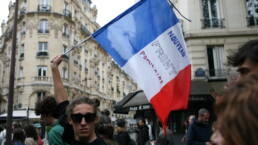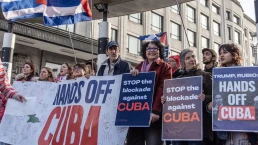The New Popular Front bloc denied the far right a victory by doing things the Democratic Party consistently fails to do.
By Harrison Stetler, The Nation
Called “the year of the elections,” 2024 has seen a withering of political objectives to their lowest common denominator: blocking the far right from power. From the United States and Europe to Narendra Modi’s India, it’s hard to deny which camp has the momentum in the 2020s. In many of the world’s democracies, a commanding plurality—what Henrik Ibsen called the “compact majority” in his 1882 drama An Enemy of the People—is turning toward authoritarian ethno-nationalism. The ideas and leaders that offered some hope only a few years ago are in retreat. In the United Kingdom, a de-Corbynized Labour Party may have won a majority in early July, but the best that can be said of new Prime Minister Keir Starmer is that he’s not 14 years of Tory rule. Having strained relations with the social movements to its left, the Democratic Party’s main case for a new term is that it’s still not Donald Trump.

France is a stubborn exception. The New Popular Front (NFP)—a broad left-wing coalition—was indeed critical in denying Marine Le Pen’s far-right National Rally a victory in this summer’s snap elections. Formed just days after President Emmanuel Macron dissolved the National Assembly on June 9, the NFP emerged as the largest bloc in France’s hung Parliament and is demanding the right to govern. But the alliance did it on a comprehensive program to turn the page on Macronism and avert the slide to the hard right, calling for the repeal of recent immigration laws and the legislation passed during the Macron era to constrain civil society. The alliance is promising to invest in public services, freeze prices on daily necessities, and reindustrialize through “ecological planning”—the French equivalent of the Green New Deal. And the NFP doesn’t beat around the bush about how to pay for it: Corporations and the wealthy would have to pony up more in taxes.
This is a coherent road map for what the alliance’s legislative contract calls “rupture.” But it’s well within the bounds of France’s political tradition, which explains the appeal of the NFP and the popular dismissal of claims that it’s too extreme. The New Popular Front harks back to the original: the 1936 alliance of liberal, socialist, and communist forces that briefly governed France amid the first pan-European rise of fascism. The NFP’s demands—an increase in the national minimum wage, dignified retirement at 62 and maybe even 60—recall key victories of 1936 like the 40-hour workweek and paid vacation. This is what France’s tradition is really about: common political and social rights. No, Léon Blum is not rolling over in his grave.
Recent Posts
Leading Papers Call For Destroying Iran To Save It
February 11, 2026
Take Action Now The opinion pages of the New York Times and Washington Post are offering facile humanitarian arguments for the US to escalate its…
Despite Marco Rubio’s Warnings, This is the Time to Go to Cuba in Solidarity Against the Latest U.S. Aggressions
February 10, 2026
Take Action Now When visiting Cuba, one can see quickly the terrible effects of the almost seven decades of the U.S. economic blockade of Cuba.By…
“Hands Off Cuba!”: Left Groups in Europe Mobilize Against U.S. Aggression
February 10, 2026
Take Action Now Hundreds demonstrated in Belgium in solidarity with Cuba as further mobilizations against US imperialism are planned across Europe.……
Democrats Propose Minor Reforms for ICE — and Record Funding
February 10, 2026
Take Action Now Congressional Democratic leaders are asking ICE to agree to reforms, promising to vote for $11 billion in funding for the agency if…




